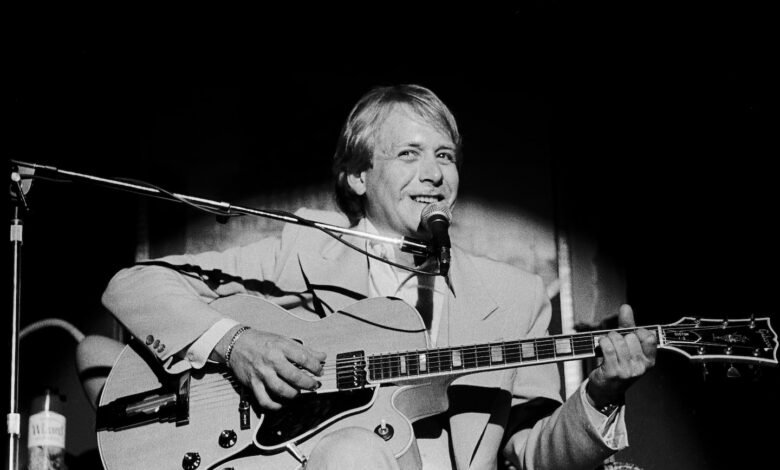The Subversive Musical Genius of Martin Mull

In the 1970s and ’80s, at a time when comedy was dominated by white men with only a few exceptions (Richard Pryor, Eddie Murphy), Mull poked fun at the Wonder Bread-y American middle class as much as any social critic, but you didn’t realize it until you realized you were laughing at your own neighborhood.
Watch the mustache wink as he finds a stack of wild geese coasters on a coffee table while strolling through a suburban home like the sweater-wearing host of the mockumentary “White History in America” and acts like he’s found the Dead Sea Scrolls. These coasters, he says as he holds one up as a visual aid, are “here to protect any natural forests. Should they occur.”
Mull later stole scenes on “Veep” and “Arrested Development.” But for me, his best performance came as the smarmy TV host Barth Gimble on “Fernwood 2 Night,” a satirical late-night talk show created by Norman Lear that aired in the summer of 1977. Gimble, emerging during the Johnny Carson era, served as a precursor to both Garry Shandling’s Larry Sanders and Zach Galifianakis’s “Two Ferns” persona. And again, he had Willard, also sadly deceased, as his criminal counterpart.
I could write another appreciation of Mull’s painting, his time at the Rhode Island School of Design, and how, over the years, Mull established himself in a career that saw his hyperrealistic works displayed in galleries and museums and even appearing on covers of books and albums.
But while we mourn Mull, I want to focus on his music. Because during the 1970s, Mull managed to produce some of the best parodies of songs ever printed on wax. There’s no half-step here. He played his Gibson guitar well enough to trade licks with Glen Campbell, though he wasn’t afraid to pick up a tuba—or a sousaphone—if that’s what the gig called for. During his musical career, Mull opened for Bruce Springsteen, Frank Zappa, and Billy Joel.
These records and performances served as a bridge between MIT professor turned parodist Tom Lehrer and the emergence of “Weird Al” Yankovic in the MTV era.
What Mull understood is that to mock a form, you had to commit to the form. Then on “Do the Nothing,” he has the audience clapping while he’s ostensibly launching into what promises to be a catchy song about a popular new dance move, except the dance is, as the title suggests, absolutely nothing. He even stops playing at the chorus to prove his point, and yet the clapping continues, awkwardly, because a crowd that’s told to clap by a star artist will, whether there’s anything clapable going on or not. Mull begins to shower praise on individual band members, though we hear they aren’t playing a note.
On another song, “Jesus Christ Football Star,” he dives into gospel as Satan delivers an onside kick and Matthew, “thinking quickly,” recovers to make Christians, first and 10: “Let’s give the ball to Jesus Christ/ let him him to tie the score/ let him pass through the crossbars/ and no longer stay on the cross.”
When I get the chance to play a Mull song for an unsuspecting friend or family member, it’s always “Ukulele Blues,” recorded in 1973. Here, he manages to perfectly mock the tradition of white cultural appropriation at a time when countless black blues artists were watching Eric Clapton, Led Zeppelin and even Ram Jam profit from original music. Which makes “Ukulele Blues” sound almost dutiful, a kind of smart-ass sermon. It’s anything but.
The blues, as Mull reminds us in a lengthy introduction, is about getting back to your roots. In this case, he says without spoiling the character, he is thinking of his grandfather, who was a real estate agent and was “very, very well off,” living in the heart of the delta. The Lake Erie Delta in Cleveland.
“A lot of you might think you have to be poor to play the blues,” he says with a dismissive laugh. “Don’t make me laugh.”
Then Mull, who often performed wearing a yellow tuxedo and bow tie, begins strumming the open-tuned ukulele on his lap. Mississippi Fred McDowell sawed off the neck of a bottle of Gordon’s gin for his slide. Mull? He uses a baby bottle—and still manages a believable accompaniment to his tale of suburban woe.
I woke up this afternoon, HOOOOO/ I saw that both cars were gone
I woke up this afternoon, sir mom/ I saw that the two cars were gone
I felt so bad deep down/ I threw my drink on the lawn
By the late 1970s, Mull would stop recording his music, but he wouldn’t abandon the tools that made those records so special: knowledge, technical skill, and commitment to the craft. These would serve him well on screen as he continued to break cultural norms, a true original who could never be replaced.




